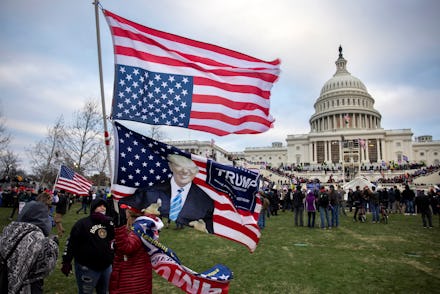"Domestic violent extremists" are a legit threat to America, DHS finally warns

In the days after former President Donald Trump refused to condemn the neo-Nazis and white supremacists who marched through Charlottesville, Virginia, in 2017, one of the Trump administration's lesser-publicized evils began garnering an added layer of scrutiny: the decision to revoke hundreds of thousands of dollars in federal grant money for organizations dedicated to helping combat domestic terrorism and extremism. Though the total amount of money in question was comparatively small, the episode served as a not-so-subtle reminder that for the former president, the nexus of white nationalism and anti-government extremism — dubbed "the most severe threat of political violence" facing law enforcement officials by Duke University's Center on Terrorism and Homeland Security in 2015 — was a non-priority at best, and an inseparable bloc of his political movement at worst.
In the time since, we've seen just how dangerous Trump's embrace of now increasingly mainstreamed ultra-nationalist groups has become, culminating with the Jan. 6 insurrection at the Capitol — an attempted coup in which an assortment of the very same racist, seditious, white nationalist groups which participated in the Unite The Right Charlottesville pogrom were front and center. And while the country is still reeling from the fallout of Trump's violent putsch attempt, a new alert from the Department of Homeland Security suggests that the sort of domestic terrorism that was allowed — and indeed encouraged — to foment under the previous administration may simply be the new normal with which we must contend for the foreseeable future.
Information suggests that some ideologically-motivated violent extremists with objections to the exercise of governmental authority and the presidential transition, as well as other perceived grievances fueled by false narratives, could continue to mobilize to incite or commit violence.
DHS also refers to these individuals as "domestic violent extremists." The warning, issued via the federal alert system, was the first time DHS had issued such an alert early 2020, after the assassination of Iranian Gen. Qassem Soleimani. Before that, it was used in 2019 to warn of the threat from extremist groups like ISIS and al-Qaeda, per ABC News.
But the department activating the federal alert system to warn of a homegrown threat is a concerning new development, especially as DHS also noted that the "heightened threat environment across the United States" will likely "persist in the weeks following the successful presidential inauguration" of Joe Biden. The bulletin has a suggested expiration date of April 30.
This isn't to say that the threat of right-wing extremism in its many forms is anything new. Hardly. But given the combination of breathing room, tacit approval, and, perhaps most importantly, the patina of legitimacy granted by the Trump administration over the past four years, the right-wing extremism which had once been relegated to the fringe has instead burst into the open and skewed the political landscape in ways both subtle and significant.
It's a dangerous situation to be in. Criminals can be apprehended; plots can be foiled; protective measures can be taken. But it's much harder and more complicated to blunt a socio-political movement once it's gathered enough steam, and once it's been able to organize — especially when one of its organizing principles is a violent grievance against just about everything.
Which is all to say: The elevated threat of right-wing extremist violence, in both its acute and more diffuse, zeitgeist-y forms, is probably going to be with us for a long time to come.